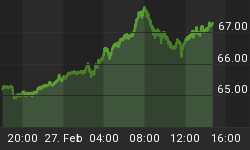Gold still represents the ultimate form of payment. Why throw it away before the Euro collapses...?
"HANDS OFF!" shouts German newspaper Bild today. "Failed states are still going to get our gold," screams the tabloid's headline.
Hmmm. "This may not be true," admits the opening sentence of the article itself. "But nevertheless!"
So what is getting Germany's version of the New York Post and Britain's The Sun - only with topless models on page 1, not 3 - so excited that it has to admit its own headlines are false in the very next line? "If Germany's exposure to the Euro-crisis rescue plan is expanded, it will be only a matter of time before the gold of the German Federal Bank melts in the debt fire!" reckons Bild columnist Einar Koch.
Not so fast, Eurocrats. Ruling coalition party politician (and "Euro rebel") Peter Gauweiler says that "Our gold reserves, only half of which by the way are still stored in Germany, are sacrosanct! Who knows how urgently we will need our gold treasure!"
Bild sures loves exclamation marks. But might it be onto something? Might the Euro bail-out mobsters gathered in Brussels to save the single currency really attack the world's second-largest national gold reserves - a full 3,401 tonnes - to raise cash where the European Central Bank won't print it?
In a word, no. Bild's rabble-rousing blocks them politically, while the terms of the Euro treaty blocks them legally. So never mind that even Germany's hoard, worth €135 billion at Wednesday's London PM Fix, is barely equal to half of Greece's outstanding debt. Selling the family silver would signal the final, ultimate crisis - Götterdämmerung - yet again. National central banks cannot use their reserves to plug holes in their government's finances (as the Banca d'Italia and ECB had to remind Silvio Berlusconi in 2009), let alone another government's books.
This isn't to say they shouldn't. Eurozone central banks hold 61% of their reserves in gold after all. So they are "overweight gold by any measure" as GFMS chairman Philip Klapwijk put it in 2010, just as the obvious buyers (or cash lenders), Asian central banks, are "underweight" by the same token with just 3% of their huge foreign currency reserves, on average, in gold. Nor is it to say they can't; British chancellors got the Bank of England to breach its Charter of 1844 three times in the following 20 years, as Brad DeLong notes, printing more money than the law allowed in "extraordinary and unforseen emergencies".
Nor are we saying there's no precedent for it. Some 346 tonnes of gold was used as collateral by 10 commercial banks in Europe just last year, raising Dollar loans from the central banks' central bank, the Bank for International Settlements, in what the BIS called "regular commercial activities". Romania used gold as collateral to secure foreign-currency loans in 1974, as Dr. K.Lakshmi of the Saudi University relates, scrambling to deal with balance of payments problems after the first oil-price crisis. Italy did the same that year, with German chancellor Helmut Schmidt acting with Bundesbank president Karl Klasen to lend Rome $2 billion without first alerting the West German central bank's decision-making council. India similarly raised cash using gold bullion to restock its foreign currency reserves after its balance of payments crisis of 1991 (also sparked by an oil-price shock after Gulf War I), pledging 20 tonnes via UBS in Switzerland and 40 tonnes via the Bank of England to secure IMF support - support it then reciprocated, long after repaying the loans, by buying 200 tonnes of IMF gold to help restructure the ailing Washington lender's own balance-sheet in 2009.
Note, however, that all these states were very desperate. Note also that they were very much alone, rather than part of a currency union supposedly built on mutual support and respect. Note too that the loans raised were for the national central bank's foreign exchange reserves - run down by attempting to defend its singular currency on the forex markets - rather than paying down debt. The massive European gold sales of the late 1990s and early 2000s did the same, turning gold into other government's debt but not being used to finance spending. Indeed, even the Russian economic meltdown ofmid-1998 only saw rumors of outright gold sales. The reported data merely showed a swap - gold for cash, with the two set to be switched back in due course - of much less than the 200 tonnes whispered in London's gold market.
And who wants to ape post-Soviet Russia just yet anyway?
"Gold still represents the ultimate form of payment in the world," as then-US Fed charman Alan Greenspan told Congress in 1999. "It's interesting that Germany could buy materials during the war only with gold. In extremis fiat money is accepted by nobody and gold is always accepted and is the ultimate means of payment..."
For now, the Eurozone doesn't need to resort to using gold to raise cash. Because like Peter Gauweiler suggests, even with a tabloid screetch, such a move might just prove all-too necessary AFTER the Euro pact fails and the union dissolves. Italy knows this. Greece, Portugal and Spain too. And not least the current union's richest member - and the world's second-largest gold holder - Germany.
"Before one gram of Bundesbank gold is pawned, the Greeks, Portuguese, Spanish and Italians must first throw their gold on the market," says Einar Koch at Bild. And seeing how much they'll want to keep hold of their gold right now - just in case - that puts Germany's 3,401 tonnes a long way from the market today.















